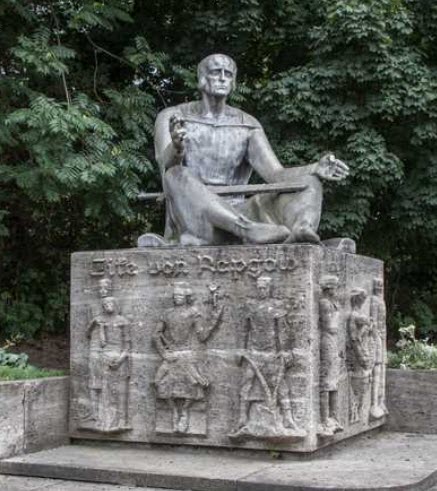Eike von Repgow (c. 1180 – c. 1233) was a medieval German administrator who compiled Der Sachsenspiegel code of law. He was well versed in both Roman law and Canon law, which indicates that he was taught law at a cathedral school.
 Der Sachsenspiegel is the most important law book and costumal of the Holy Roman Empire, and it has had a long-lasting impact on German law.
Der Sachsenspiegel is the most important law book and costumal of the Holy Roman Empire, and it has had a long-lasting impact on German law.
The modern German saying “Wer zuerst kommt, mahlt zuerst” (The one who arrives first, grinds first) can be traced back to the Sachsenspiegel, where Eike wrote “Die ok irst to der molen kumt, die sal erst malen” (The one who comes to the mill first shall grind first).
Monuments have been erected to commemorate Eike von Repgow in Magdeburg, Halbersteadt, Dessau, and Reppichau, and also at the Falkensteain Castle in the Harz Mountains. In Berlin, a square is named after him, and Magdenburg and Halberstadt each have a school named in his honor.In Eike von Repgow’s native village Reppichau, you can visit an open-air museum devoted to him and to the Sachsenspiegel.
Each year, one academic acomplishment of a historical or legal nature is awarded with the Eike von Repgow Prize. The prize, which is awarded jointly by the Otto von Guericke University of Magdeburg and the city of Magdeburg, consists of €5,000, a statuette of Eike and a certificate.
Life
Little is known about the life of Eike von Repgow, but he is mentioned in several documents that have survived from the early 13th century. The oldest one is from 1209 and the most recent one from 1233. In these documents, his name is spelled in various ways, such as von Repkow, von Repchow, von Repchau, and von Repgow.
His exact birth year is not known, but it was probably around the year 1180. (This assumption is based on preserved court proceedings from 1209 where he is mentioned.)
Eike von Repgow belonged to Ostfalen gentry, and his family is believed to have been vassals of the Magdeburg archbishops. Ostfalen is a historic region in eastern Germany, known in English as Eastphalia. Eike von Repgow’s ancestors had moved to Serimunt south of Magdenburg in the 1100s and acquired land in the village of Reppichau.
Education
Since Eike von Repgow was well versed in both Canon law and Roman law, it has been assumed that he was educated at a cathedral school, although we can not know this for sure. If he went to cathedral school, the one in Magdeburg is the most likely one, but the one in Halberstadt has also been suggested.
Eike von Repgow could read both Latin and German. It is unclear if he could write or not. In his era, it was fairly common for learned persons to hire scribes rather than write themselves.
Position
In some documents, Eike von Repgow is listed as a free noble, while in others he found among the bondsmen (Dienstmannen). One theory is that he was born a free noble and then became a Dienstmann without losing hos noble status. If he was a Dienstmann, it was probably for Count Henry I of Anhalt or Count Hoyer of Falkenstein.
Death
We don’t know when Eike von Repgow died, but there are no mentionings of him in documents younger than 1233.
Der Sachsenspiegel
Der Sachsenspiegel is the most important law book and costumal of the Holy Roman Empire. It was written down from around the year 1220 as a record of existing customary law. The book was intended to compile and document existing customary law – not create new law. Der Sachsenspiegel has had a long-lasting impact on German law and was used in places until as late as 1900.
Der Sachsenspeigel is also important as an example of written Middle Low German prose from the 13th century. It is the oldest known long legal document written in a continental Germanic language. The title Sachsenspeigel is its name in modern German; its original name was Sassen Speygehl. Both names means Saxon Mirror.
In the verse prologue to Der Sachsenspiegel, Eike von Repgow lets us know that he first wrote it in Latin and then later (somewhat reluctantly) translated it to German at the behest of Count Hoyer von Falkenstein.
The Latin version of the book is only been partly preserved. The first part – the one on Landrecth (common law) – has disappeared. The second part, wich is about Lehensrecth (feudal law) and is written in verse, has survived. In Latin, the part is named Vetus auctor de beneficiis.
Where was the job done?
We don’t know exactly where Eike von Repgow was when he did his work with compiling the laws and writing them down. It was long assumed that he was working in Quedlinburg or from the Falkenstein Castle in the Harz Mountains, but Peter Landau – an expert in medieval canon law – has suggested the Cistercian abbey of Altzelle as another possibility.
This article was last updated on: December 3, 2020
